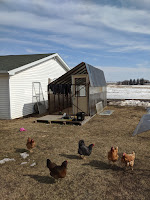 Everyone uses soap but rarely does
anyone know what's in it. I only just realized the components to soap
when it became a solution for our 20lbs of lard from our pigs. I
started freezing the lard but I could only make so many pie crusts
before lard started taking over our freezer. Now we are avid soap
makers and sell it at our farmer's market. We make it with lye,
water, lard, and essential oils. It's very interesting to see the
public's reaction to our lard soap. I think it's interesting enough
to share.
Everyone uses soap but rarely does
anyone know what's in it. I only just realized the components to soap
when it became a solution for our 20lbs of lard from our pigs. I
started freezing the lard but I could only make so many pie crusts
before lard started taking over our freezer. Now we are avid soap
makers and sell it at our farmer's market. We make it with lye,
water, lard, and essential oils. It's very interesting to see the
public's reaction to our lard soap. I think it's interesting enough
to share.
Our reaction was to inform her that all
soap is made with lye. If there is no lye then it's NOT soap, it's
detergent.
2. “Isn't lye bad for your skin?”
Lye mixed with water and fat chemically
reacts in a process called saponification. Once that happens the
finished product of soap doesn't contain lye because the fat
neutralizes the lye.
3. “On an ingredient label of Dove
or Irish Spring it doesn't say lye.”
Lye became a word that consumers didn't
want to hear so labels now use a different name for it. It is more
likely saponified oils or sodium cocoate, which is sodium hydroxide
(lye) mixed with coconut oil. Each soap manufacturer has their own
recipe which can make it less harsh based on how much fat or oil they
put in it. All the recipes start with lye, water, and some sort of
fat, oil, or butter.
4. “Why do some soaps advertise no
lye.”
Some people use soap melts to make
their soap. When they use soap melts, they are using soap chips that
they are melting, adding color and fragrance to, and pouring into
their own molds. They are finishing the soap making process, but
someone else did all the work to make soap chips or melts.
5. “I can smell the lard.”
Yes, plain soap with no fragrance will
smell like whatever fat or oil that is used. However, it washes away
clean and doesn't leave you smelling like lard. It is also very
moisturizing.
We have learned a lot since we started
making soap. We were completely unaware of the process or what went
into it. Now we have over a year of soap making experience and are
happy to educate the public about soap. We enjoy making it, but the
best part is using the lard that our pigs give us.



























